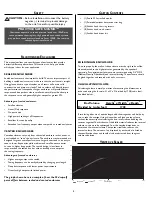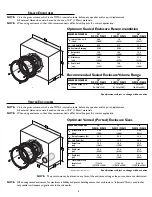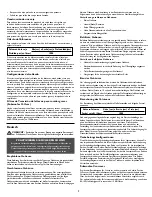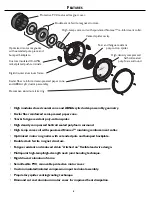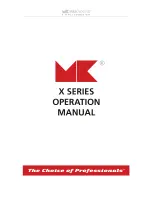
5
Specifications subject to change without notice
PUNCH P3-DVC
10"
12"
15"
P3D210 / P3D410
P3D212 / P3D412
P3D215 / P3D415
Nominal Impedance (ohms)
2 x 2 / 2 x 4
2 x 2 / 2 x 4
2 x 2 / 2 x 4
Frequency Response (Hz)
29-250
27-250
22-250
Voice Coil Diameter - inch
2.5 (4-Layer)
2.5 (4-Layer)
2.5 (4-Layer)
(cm)
(6.35)
(6.35)
(6.35)
Displacement - cu. ft.
0.074
0.094
0.107
(Liter)
(2.10)
(2.66)
(3.03)
Fs - Free Air Resonance (Hz)
29
27
22
Qts
0.50 / 0.55
0.48 / 0.52
0.58 / 0.61
Vas - cu. ft.
0.87
1.55
4.98
(Liter)
(24.5)
(43.9)
(141.0)
Xmax - inch
0.528
0.528
0.528
(cm)
(1.34)
(1.34)
(1.34)
SPL (dB @ 1w/1m)
83
85
86
Power Handling-Watts (RMS)
400
500
500
(Peak)
800
1000
1000
S
PECIFICATIONS
W
IRING
C
ONFIGURATIONS
By varying the wiring configuration of your speakers you can create an
impedance load to match your system.Altering the wiring configurations
gives a range of options for impedance loads. Series, Parallel, or
Series-Parallel wiring configurations are different techniques for wiring
speakers that provide different loads. Series configuration is a string
method where speakers are wired end to end. Parallel configuration
uses two or more speakers wired across common terminals.
Series-Parallel configuration combines both techniques. Choose the
wiring diagram that corresponds to the number of woofers and the
impedance of your amplifier.
SUBWOOFER CROSSOVERS
There are two operational types of crossovers, passive and active.
Passive crossovers (coils or inductors) are placed on the speaker
leads between the amplifier and speaker.An active crossover is an
electronic filter that separates the audio signal fed to different
amplifiers. For optimum subwoofer performance, we recommend
using an active 80-100Hz low-pass crossover at 12dB/octave.


